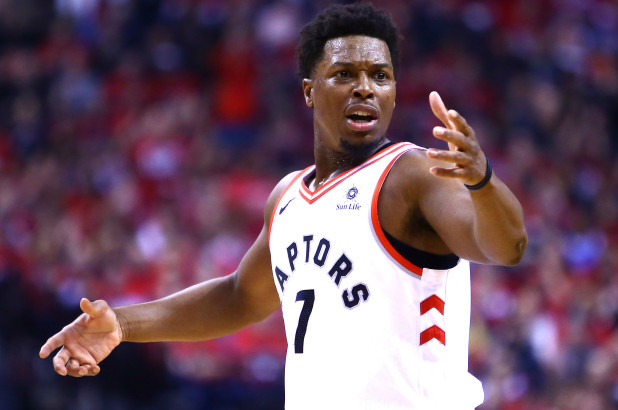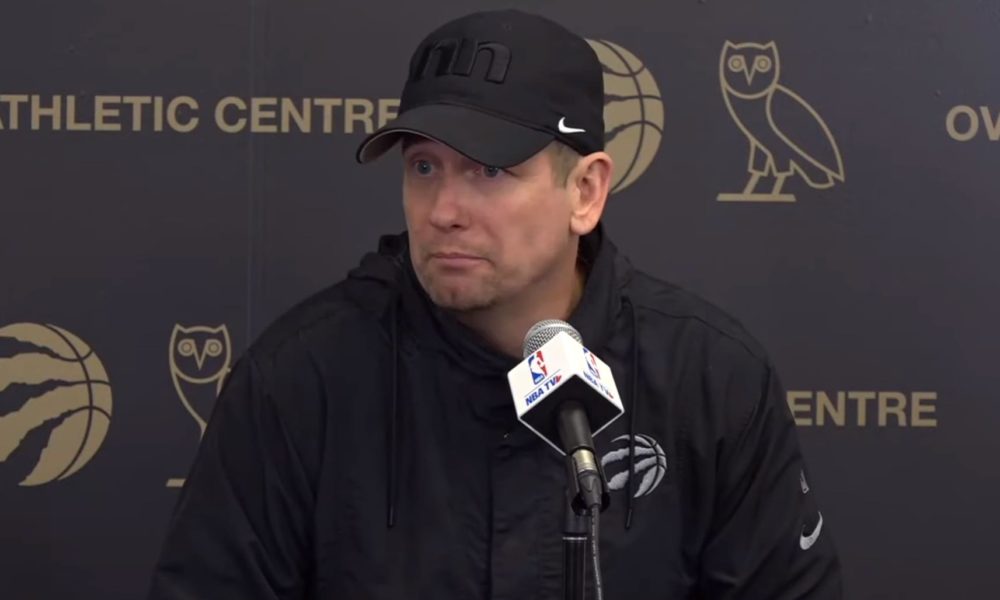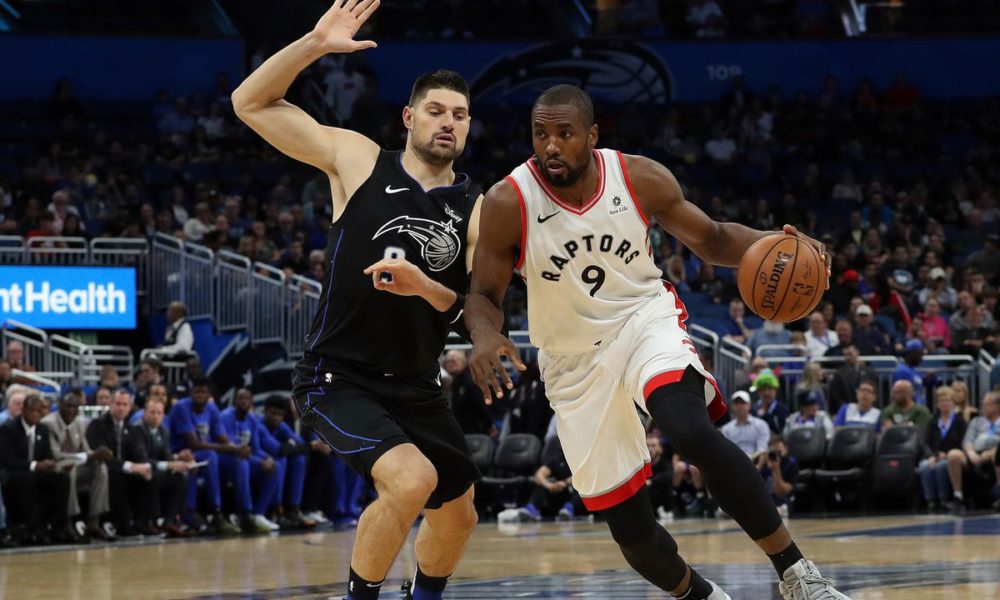A two-day break feels a lot more comforting after a convincing win. It’s finally time for game three, and this time it’s Orlando who needs to make changes. Toronto needed to adapt after the first loss, and they surely did. Toronto won game two 111-82 behind stifling team defence and a big dose of Kawhi Leonard.
“Obviously I think our defence stood out last night,” said Nick Nurse at practice the next day. “I think it was a total team effort, right? On the ball, off the ball, disruption on the ball, breakdowns were getting covered up quickly, transition defence was better. Somebody asked me the other day, ‘Who are you?’ That’s who we need to be.”
Toronto’s defence was not only effortful, but it was also incredibly tight and well-designed. Samson Folk brilliantly covered Marc Gasol’s contributions here. But here’s a relevant section:
“In the second half, the Raptors – focusing on Gasol and Danny Green – played a very aggressive brand of pick n’ roll defense against Augustin, and it was largely successful. Outside of Augustin’s late game heroics (5-points in final two minutes) he was limited to one free throw in the second half. The Raptors were emboldened by their success in the second half of Game 1, and utilized the same defense in Game 2.”
Gasol collected four steals, as his high shows on ball screens set for DJ Augustin basically stymied Orlando’s entire offence. At the same time, Gasol walled off Nikola Vucevic, limiting him to 3-for-7 shooting with four turnovers. On that front, however, Gasol had help.
Toronto cheated off of non-threatening weak-side shooters to double and sometimes triple Vucevic. I covered that in relevant detail here, but the basic premise is that Jonathan Isaac is such an offensive negative for Orlando that they can’t score when he’s on the court.
There are ways for Orlando to mitigate a non-shooter whom Toronto creatively ignores. For one, Orlando can use Isaac as a screener, especially off the ball. It’s not Isaac’s strong suit, but it does bring his defender back into a play. Isaac could set pindowns for good shooters – namely, Augustin or Terrence Ross – when Pascal Siakam cheats away from him. That would mean the Raptors wouldn’t have a help defender able to step up to deny the shot, giving Orlando’s best shooters some space that they couldn’t create last game. Isaac also needs to become a better cutter, timing his movements more decisively. He was very passive in game two when Toronto ignored him, often cutting at half speed and pulling back early. The most important way for Isaac to hurt Toronto would just be for him to make his shots. A coach can only do so much to help a guy, and at some point he just needs to play better. Steve Clifford said as much after game two.
“There’s only so many things you can do,” said Clifford. “A coach’s responsibility is to put guys in position where they can play best, but also, players have to figure some things out on their own.”
One thing is certain. If Orlando can’t find a way to score, this series will only go five games.
On the other end, Toronto’s offence was much more decisive in game two than game one. Orlando’s defence remained solid, but it broke apart a little bit in the third quarter. Toronto stretched Orlando’s principles so that the Magic had to make tough choices. It’s impossible to make the right choice, in hard situations, 100 times over the course of a game. Seams were bound to open for Toronto.
This is a repeatable result. You can’t always rely on Lowry to get to the rim 10 times, or Leonard to miss only four times through the first three quarters, but the principles behind Toronto offensive output in game two were replicable. They were relatively simple.
Toronto put the ball in the hands of Kawhi Leonard. He posted a 33.8 percent usage rate in game two after 31.5 percent in game one. That number could creep even higher in game three; he should attempt north of 30 shots if Toronto’s motion offence doesn’t create open looks. I covered Leonard’s attack here, but the general idea was that he mercilessly abused Orlando’s weaker defenders. Gasol set countless high ball screens for Leonard, and Vucevic has no way of containing Leonard in those actions. Vucevic tried to show, drop, and even switch at times, and Leonard had counters for everything.
Gasol established himself as a passer from the top of the key, and when Orlando stretched to take away those lanes, Gasol punished them by hitting some triples. Lowry and Siakam attacked weaknesses, and both were terrific at driving against rotating defenders.
Can Orlando get a little more defensive traction in game three? They might not have the personnel to stop Leonard-Gasol two-man actions, but they’ll need to find a way. To repeat, the adjustments are firmly Orlando’s to be made. Toronto made some changes between game one (although they really made them at halftime in game one) and game two, and they worked. Can Orlando counter?
Toronto Updates
OG Anunoby (appendectomy) remains out, but Patrick McCaw (thumb) is probable.
PG: Kyle Lowry, Fred VanVleet, Jeremy Lin
SG: Danny Green, Patrick McCaw, Jodie Meeks
SF: Kawhi Leonard, Norman Powell, Malcolm Miller
PF: Pascal Siakam
C: Marc Gasol, Serge Ibaka, Eric Moreland, Chris Boucher
Orlando Updates
Nothing new. Mo Bamba (leg), Markelle Fultz (shoulder), and Timofey Mozgov (knee) remain out.
PG: DJ Augustin, Michael Carter-Williams, Jerian Grant
SG: Evan Fournier, Terrence Ross
SF: Aaron Gordon, Wesley Iwundu
PF: Jonathan Isaac, Jarell Martin, Amile Jefferson
C: Nikola Vucevic, Khem Birch
Rotation notes
- Toronto’s starters have been absolutely brilliant. They finished +23 in only 15 minutes in game two, which brings their total to +36 in 36 minutes. If Toronto gets in trouble going forward against Orlando, the easy answer is just to play the starters. It’ll work.
- Fred VanVleet has had a tough series. Toronto has asked him to chase Ross, and though VanVleet can get around the screens and keep Ross off-balance, Ross can just shoot over him. Michael Carter-Williams’ length has also bothered VanVleet on the other end. Toronto has only had six non-garbage time lineups with negative plus-minuses through two games. VanVleet has played in five of them.
- If Ross really explodes, Toronto could consider giving Patrick McCaw some of VanVleet’s minutes. The offensive drop-off is steep, but McCaw is readymade to guard guys like Ross. He’s great at getting around screens, and he’s long enough to bother Ross’ shots. He’d be a threat to strip Ross as well, as McCaw is great at bothering the dribble, and Ross’ handle is loose.
- The Ibaka-Gasol minutes were fine for Toronto in game one, but Nurse didn’t use them in game two. (They were a +2 in 3.4 minutes in the first). He talked more about using Leonard as the backup power forward in game two. It makes sense. The Ibaka-Gasol lineup is fine defensively against Orlando, but it’s not good on offence. Leonard is far better there, and it’s another way to get his minutes a little higher.
- The only lineup without Siakam at power forward in game two (outside of garbage time) was Lowry-VanVleet-Powell-Leonard-Ibaka. It was terrific, finishing +10 in 8 minutes. When Leonard is as locked-in as he was in game one, it doesn’t matter so much who his teammates are. But this is a great look, and expect Toronto to use this as a bench lineup in game three. In the regular season, Toronto really only found bench success with Leonard-Green and Lowry-Siakam pairings, so it’s good to see a cross-match, Lowry-Leonard, finding success in game two.
- Toronto used 10 non-Leonard lineups in game two. They all finished with an even or worse rating except one, which finished +1. That’s… not great. Toronto needs to find ways to win minutes when Leonard hits the bench. Hitting their triples would help, but that’s something to watch going forward.
- The starters with VanVleet in place of Lowry bled to a -16 in five minutes in game one. The same group played only one minute in game two, but they were a net neutral. They shouldn’t lose so badly, and they were +27 in 87 minutes in the regular season. It’s a good look, and Nurse shouldn’t be afraid to use it going forward because of five bad minutes in game one.
- Ibaka has been absolutely fantastic on both ends. Gasol gets a lot of love – and rightly so – for his job on Vucevic. Gasol deserves to be the starter. But Ibaka has adopted his new role with vigor, and he’s been Toronto’s most (only?) trustworthy bench guy in the playoffs. He had 13-8-2 in only 23.5 minutes in game two. His lineups have actually built leads, rather than just treading water, and it’s been marvelous to watch.
Assorted
- McCaw will be back, which is nice, but not super duper relevant. He’s a more consistent defender than Powell, especially on the ball, and he’s great at creating deflections. But he’s such a one-dimensional player at this point that Toronto probably doesn’t risk using him in the rotation unless Orlando’s guards really go off. McCaw knows that, and he’s bringing the right, team-first approach:
- “It’s all a mindset, whatever coach sees fit for me, where they want to place me on the floor, if they want to play me,” he said at practice. “If they don’t, it’s me attacking practices and workouts as if just being ready and staying ready.”
- Tony Brothers is on the crew tonight after Marc Davis in game one.
- Leonard played 33 minutes again in game two. Funny how those things happen. He was in foul trouble for the whole game, yet Nurse rode him to great success. His low minutes were because he sat the last half of the fourth quarter, not because of foul trouble.
- The shooting has been right bad, there, b’y. Toronto shot 12-for-36 from deep in game one, and they were actually worse in game two, finishing 11-for-35. That they managed to dominate game two, despite the poor shooting, despite the sketchy officiating, shows that Toronto can beat Orlando without making their deep shots. They’ll need it going forward, but it’s not such a big deal for now. Shooting is streaky, and Toronto is getting good looks, so don’t be too concerned.
The Line
Toronto is -5 against Orlando after more than covering -10.5 in the last one. Home court is decidedly not worth 5.5, so Vegas has Orlando bouncing back here while still remaining the underdog. The over-under is 210.



